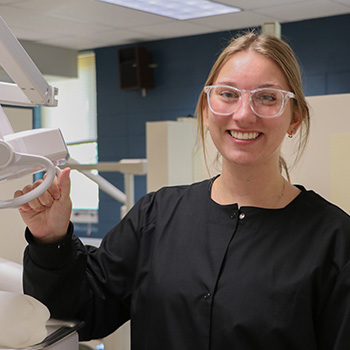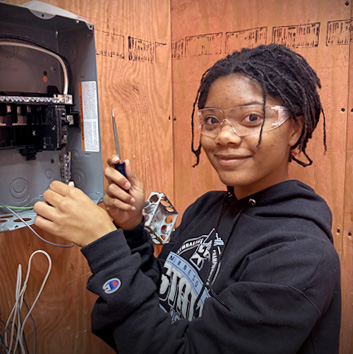Minnesota West Policies
Chapter 6 - Facilities
6.4.4 Pets on Campus
Minnesota West recognizes an inherent health and safety issue with the presence of pets on campus. Therefore, the presence of dogs, cats, and other pets is prohibited in all college buildings at all times except as authorized by the Campus Administrator. A service animal shall be exempt from these provisions. A Service Animal is defined as per the Federal Register, 9/15/10 Sec. 35.136 Service animals.
The presence of dogs, cats and other pets shall be prohibited on all other college property unless they are on a leash under the control of and accompanied by a person. Any dog, cat or other pet found in violation of the policy may be impounded and its owner subject to disciplinary action.
Reference: Federal Register, 9/15/2010 Sec. 35.136 Service Animals
Approved by: Richard Shrubb
Date: May 4, 2011
History & Revision: Originated 7/1/2003
Minnesota West Policies
Chapter 6 - Facilities
6.4 Facility Use
Purpose
To establish guidelines for the use of college facilities by community based groups and other governmental agencies.
Policy
Minnesota West Community & Technical College (Minnesota West) welcomes community based groups and others to use our campus facilities. The following guidelines, rules and fees are established to help coordinate this effort so that we can continue to meet the needs of our primary mission to our students, faculty and staff as well as our constituents in the community.
The Campus Dean or his/her designee shall serve as the Facility Use Coordinator.
Guidelines
- All college facility use shall be scheduled through the Facility Use Coordinator.
- Minnesota West reserves the right to reject room requests if they are determined to be inconsistent with its mission, vision and values.
- All Minnesota West facilities are smoke free and alcohol free.
- Food and Beverages are allowed only in approved areas as designated by each campus.
- Minnesota West classes and sponsored or co-sponsored events will be given priority when scheduling other facilities use requests.
- An approved college employee is required to be on duty whenever any group or organization is using the facility.
- No event shall in any way obstruct, hamper or endanger the normal function and purpose of the college.
- All user groups must reserve a room commensurate with the number of participants.
- Internal users shall submit requests using virtual EMS.
- All other users should contact the facility use coordinator or designee.
- Requests must be received at least two weeks in advance for use outside of the 8:00 until 5:00 Monday through Friday timeframe and/or for use of specialty spaces.
- When approved, one copy of the signed contract will be returned to the sponsor. Any modifications involved in meeting their request will be noted.
- All users groups must provide proof of insurance per Minnesota State policy at time of reservation. The amount of insurance is required by the state of Minnesota and is detailed in the Facilities Use Agreement.
- The applicant is responsible for the preservation of order during the use of the facility.
- Notice of cancellation must be provided to the college at least 24 hours in advance.
- Applicants will be responsible to turn out lights and leave facilities in the same condition as found.
- Groups in excess of 100 may require additional clean up time at a rate of $20 per hour.
- Users will be assessed a $100 charge for additional garbage pick-up, if warranted.
- Any exceptions to the above stated guidelines of facility use require the signature of the Campus Dean.
All inquiries regarding the use of Minnesota West Community & Technical College facilities should be directed to the Campus Dean or the Facility Use Coordinator at each campus.
Minnesota West reserves the right to revoke an approved application at any time if the above specified guidelines are found to be violated.
Facility Use Rates: Facility Use Rates
Approved by: Ron Wood, President
Date: July 1, 2003
History & Revision: Feb. 1, 2008, September 9, 2011, May 2016
Minnesota West Policies
Chapter 5 - Administration
5.22.2 Cellular and Mobile Device Policy
Part 1. Purpose
Electronic communication is an important part of contemporary business practices, including the operations of Minnesota West. The purpose of this procedure is to clarify institution and employee responsibilities associated with provision of cellular devices and mobile computing devices.
Part 2. Definitions
Subpart A. Cellular device
Cellular device means a cell phone or a mobile computing device with voice capability. A cellular device is characterized by the fact that service plan cost generally is determined by the amount of use.
Subpart B. Mobile computing devices
Mobile computing devices are portable computing and telecommunications devices that can execute programs. This definition includes, but is not limited to, notebooks, Palmtops, personal digital assistants, IPods, BlackBerry devices, and cell phones with internet browsing capability. Use of a mobile computing device may or may not require a wireless communication service plan or incur connection charges.
Subpart C. Department cellular device
A cellular device purchased and maintained by a department or division for use by more than one employee or other authorized user while engaged in their assigned duties.
Subpart D. Other wireless communication service
Other wireless communication service is any subscription-based communications service that relies on commercial cellular services for data or voice transmissions. These services are often marketed using names such as mobile content, wireless music services, cellular services, 3G wireless services, text messaging services, digital cellular services, mobile wireless services, mobile data services, wireless data services, wireless telecommunications services, analog cellular services, cellular data services, etc.
Subpart E. Voice over Internet Protocol applications or VoIP
Voice over Internet Protocol applications and related devices are outside the scope of this procedure. The downloading of VoIP applications onto system-owned equipment is governed by System Procedure 5.22.1, Part 4, Subpart B(4). Acceptable Use of Computers and Information Technology Resources.
Part 3. Eligibility for Cellular Device, Mobile Computing Device, or Other Wireless Communication Service Plan
Minnesota West may provide a cellular device or a mobile computing device, or other wireless communication service plans to an employee if it is determined by the college to be a necessary business expense under one or more of the following criteria:
- Availability of device and service is integral to the performance of specific duties within the employee’s job description;
- A substantial portion of the employee’s work is conducted outside of the building or buildings where the employee is assigned to work;
- The employee does not have an assigned office or workspace and needs to be contacted on a regular basis by the college for assigned services or to provide needed information;
- It is a job requirement that the employer be able to reach the employee outside of the employee’s normal work hours.
Minnesota West is not required to provide a device or service plan if it determines that there is not a sufficient business purpose for the expense or that it is not in the financial interests of the college.
Part 4. Authorization and Annual Review
Subpart A. Authorization
To be approved for a device (and service plan, if applicable) under this procedure, the following procedures are applicable:
- The supervisor of an employee requesting the device and plan must determine if the employee meets the threshold eligibility requirements in Part 4.
- A device shall be issued only if approved by an authorized administrator of the college.
- Documentation to support the decision to issue the device and plan must be retained by the supervisor consistent with records retention standards and be available for review and audit.
- Minnesota West will procure devices and plans under state or system negotiated contracts when possible.
Subpart B. Annual review
The employee’s supervisor and the authorized administrator annually must review and document the continued business need for the device and plan.
Part 5. Employee Responsibilities
- An employee who receives a cellular device or mobile computing device under this procedure is responsible for ensuring that the device is available for service during applicable business hours and as needed.
- The employee must immediately return the device upon request by the employee’s supervisor or upon the end of employment.
- The employee must comply with the provisions in this procedure.
Part 6. Cellular Devices
Subpart A. Personal Use Prohibited
Personal use of a cellular device and plan issued under this procedure is prohibited. Personal use may result in revocation of the employee’s cellular device and plan usage. Except in the case of an essential use, the employee is subject to disciplinary action for the unauthorized use of the cellular device or plan. A call is considered essential if the employee establishes that the personal call was:
- An unsolicited and isolated incoming call; or
- Minimum duration, urgent in nature, and could not have been made from a different telephone.
Employees must reimburse the state for all personal calls.
Subpart B. Monthly Review of Invoices
Monthly invoices will be presented to each employee. The employee must review and initial the invoice and identify any use not permitted under this procedure before approving it for payment. The business manager will review the monthly invoice for reasonableness.
Subpart C. Payment Options for Cellular Device Expenses
Minnesota West will pay for business-related cellular device expenses only through either reimbursement to the employee for occasional, incremental actual expenses or direct payment to a vendor for a cellular device and service plan owned and managed by the institution.
Subpart D. Reimbursement for Occasional, Incremental Actual Expenses
Business calls. Occasional business call expenses made from an employee’s personal cellular device are eligible for reimbursement if:
- The employee has not been issued a cellular device by the college or the assigned cellular device does not receive service in the area from or to which the call was made; and
- The employee has incremental costs directly attributable to the business calls.
Reimbursement shall be made through the business expense reimbursement process.
Subpart E. Personal calls while on travel status
Certain bargaining agreements or compensation plans provide that an employee in travel status overnight may claim expense reimbursement for actual personal telephone calls up to a defined limit. Employees who are issued a cellular device may make limited personal calls in lieu of claiming such reimbursement for calls while in travel status.
Subpart F. Department cellular devices
Minnesota West may purchase cellular device equipment and service plans if the college determines the cellular device is necessary for the efficient operation of a department and the cellular device will be used by more than one individual.
- A department cellular device shall be used solely for business purposes. The equipment is designated as property of the college and must be returned to the department daily or as required. Examples of such department users might include maintenance personnel who need to be accessible by phone during their work shift.
- Purchase of department cellular device equipment or service plans must be approved by an appropriate administrator. At the time of purchase, the responsible party for each department cellular device must be identified. The responsible party must perform the actions required under this procedure.
Related Documents:
Related Guidance
I. Use of a Personal Cellular Telephone for State Business
Occasional business call expenses made from an employee’s personal cellular device are eligible for reimbursement if the employee has incremental costs directly attributable to the business calls. Incremental costs are actual verifiable costs that are separately identified for each state call in excess of the standard monthly service fee.
Reimbursement will be made only if the business calls were reasonable and caused the employee to exceed the employee’s plan minutes. For example, if the personal plan is for 1000 minutes and in a given month the employee uses 950 personal and 100 business minutes, the employee would only be eligible for reimbursement for the incremental costs associated with the 50 minutes that exceeded the plan.
If the next month under the same plan the employee had 900 personal and 100 business minutes, the employee would not to be entitled to reimbursement because the business calls made did not cause the employee to incur additional (incremental) costs on the employee’s phone bill.
To qualify for reimbursement, an employee must prepare an Employee Expense Report and submit the documentation (a copy of the service contract, a copy of the bill, and notations as to who was called and the business purpose of each business call). The employee's supervisor must review the documentation and sign the report. If reimbursement requests are routinely submitted, the supervisor should consider the assignment of a cellular device to the individual employee.
II. Data Practices and Records Retention
Public employees should understand that any records they create related to system business – including text messages, voicemail message, emails, and other electronic communications, are not entitled to privacy from the employer and may be government records. These records therefore (1) should be managed according to college, university, or Office of the Chancellor record retention policies, and (2) may be subject to disclosure under the Minnesota Government Data Practices Act if someone requests them. These guidelines are intended to help employees manage the business-related messages sent or received on cellular or mobile computing devices to appropriately keep what should be kept and delete what is unnecessary.
The general rule is that business-related records that the institution retains must be kept on system – not personal – computer systems, and business-related records that do not require retention should be deleted on an on-going basis. This rule applies to college information transmitted on an employee’s cellular device or mobile computing device, whether the device is owned by the employee or provided by the college.
The Cellular and Mobile Device policy implemented by Minnesota West Community & Technical College is based on the policies, definitions and guidelines established by the Board of Trustees of Minnesota State in Minnesota State Policy 5.22.2.
Additional information for those that would like an institutionally issued cell phone or other mobile devices Cell Phone FAQ; Cell Phone Responsibilities; Cell Phone Authorization; iPad Usage
Approved by: Richard Shrubb, President
Date: April 14, 2010
History & Revision: July 26, 2017 Minnesota State link
Minnesota West Policies
Chapter 5 - Administration
5.22.1 Acceptable Use of Computers and Information Technology Resources
Part 1. Purpose
Subpart A. Acceptable use
This procedure establishes responsibilities for acceptable use of Minnesota State information technology resources. Minnesota West Community & Technical College information technology resources are provided for use by currently enrolled Minnesota West Community & Technical College students, administrators, faculty, other employees, and other authorized users. Minnesota West Community & Technical College information technology resources are the property of Minnesota State, and are provided for the direct and indirect support of the Minnesota West Community & Technical College’s educational, research, service, student and campus life activities, administrative and business purposes, within the limitations of available Minnesota West Community & Technical College technology, financial and human resources. The use of Minnesota State information technology is a privilege conditioned on compliance with Minnesota State Policy 5.22, System Procedure 5.22.2 Cellular and Mobile Computing Devices and any procedures or guidelines adopted pursuant to this procedure. Minnesota West Community & Technical College encourages the use of information technology as an effective and efficient tool within the framework of applicable State and federal laws, policies and rules and other necessary restrictions.
Subpart B. Academic freedom
Nothing in this procedure shall be interpreted to expand, diminish or alter academic freedom, articulated under Board policy and Minnesota West Community & Technical College collective bargaining agreements, or the terms of any charter establishing a Minnesota West Community & Technical College library as a community or public library.
Part 2. Applicability
This procedure applies to all users of Minnesota West Community & Technical College information technology, whether or not the user is affiliated with the college and to all uses of those resources, wherever located. This procedure establishes minimum requirements and Minnesota West Community and Technical College may adopt additional conditions of use, consistent with this procedure and Policy 5.22, for information technology resources under their control. Minnesota State is not responsible for any personal or unauthorized use of its resources, and security of data transmitted on its information technology resources cannot be guaranteed.
Part 3. Definitions
Subpart A.
The definitions in System Procedure 5.22.2, Cellular and other Mobile Computing Devices apply to this procedure.
Subpart B. Security measures
Security measures means processes, software, and hardware used by Minnesota West Community & Technical College and network administrators to protect the confidentiality, integrity, and availability of the computer resources and data owned by the Minnesota West Community & Technical College or its authorized users. Security measures may include, but are not limited to, monitoring or reviewing individual user accounts for suspected policy violations and investigating security-related issues.
Subpart C. System
System means the Board of Trustees, the Office of the Chancellor and state colleges and universities and any combination thereof. College means Minnesota West Community & Technical College students, employees and guests users.
Subpart D. Minnesota West Community & Technical College information technology
Minnesota West Community & Technical College information technology means all Minnesota West Community & Technical College facilities, technologies, and information resources used for information processing, transfer, storage and communications. This includes, but is not limited to, computer hardware and software, computer labs, classroom technologies such as computer-based instructional management and computing and electronic communications devices and services such as modems, e-mail, networks, telephones, voicemail, facsimile transmissions, video, mobile computing devices, and multimedia materials.
Subpart E. Transmit
Transmit means to send, store, collect, transfer or otherwise alter or affect information technology resources or data contained therein.
Subpart F. User
User means any individual, including, but not limited to, students, administrators, faculty, other employees, volunteers, and other authorized individuals using Minnesota West Community & Technical College information technology in any manner, whether or not the user is affiliated with Minnesota State colleges and universities.
Part 4. Responsibilities of All Users
Subpart A. Compliance with applicable law and policy
- Users must comply with laws and regulations, Board policies and Minnesota West Community & Technical College procedures, contracts, and licenses applicable to their particular uses. This includes, but is not limited to, the laws of libel, data privacy, copyright, trademark, gambling, obscenity, and child pornography; the federal Electronic Communications Privacy Act and the Computer Fraud and Abuse Act, which prohibit “hacking” and similar activities; state computer crime statutes; applicable conduct codes, including the System Procedure 1C.0.1, Employee Code of Conduct, student conduct codes; applicable software licenses; and Board policies 1.B.1, prohibiting discrimination and harassment;1. C.2, prohibiting fraudulent or other dishonest acts; and 3.26, concerning intellectual property.
- Users are responsible for the content of their personal use of Minnesota West Community & Technical College and System information technology, and may be subject to liability resulting from that use.
- Users must use only Minnesota West Community & Technical College and system information technology they are authorized to use and use them only in the manner and to the extent authorized. Ability to access information technology resources does not, by itself, imply authorization to do so.
- Users are responsible for use of Minnesota West Community & Technical College information technology under their authorization.
Subpart B. Unauthorized use
Users must abide by the security restrictions on all Minnesota West Community & Technical College and information to which access is authorized.
- Users must not allow others who are not authorized to:
- use any account or password assigned by the college or system to anyone else;
- share any account or password, assigned to the user by the college or system , with any other individual, including family members;
- allow others to use college or system information technology under the user’s control;
- use college or system cellular telephones or computer services for personal use unless specifically authorized by college or system policy or procedure.
- Users must not circumvent, attempt to circumvent, or assist another in circumventing security controls in place to protect the privacy and integrity of data stored on system or college information technology.
- Users must not change, conceal, or forge the identification of the person using college information technology, including, but not limited to, use of e-mail.
- Users must not knowingly download or install software onto college or system information technology unless it has been pre-approved through established college or system procedures, or prior authorization is received from the designated officials. Users who knowingly or negligently do not comply may be held responsible for damages, cost of college debugging, and payment of software fees, licenses and infringement penalties.
- Users must not engage in activities that interfere with or disrupt network users, equipment or service; intentionally distribute viruses, worms, Trojans, or other malicious code; or install software or hardware that permits unauthorized access to college or system information technology.
- Users must not engage in inappropriate uses, including:
- activities that violate State or Federal law or regulation;
- wagering or betting;
- Harassment, threats to or defamation of others, stalking, and/or illegal discrimination;
- Fund-raising, private business, or commercial activity, unless it is related to the mission of the college or system Mission related activities are determined by the college, or Office of the Chancellor, and include activities of authorized campus or college -sponsored organizations;
- storage, display, transmission, or intentional or solicited receipt of material that is or may be reasonably regarded as obscene, sexually explicit, or pornographic, including any depiction, photograph, audio recording, or written word, except as such access relates to the academic pursuits of the college student or professional activities of a college employee; and
- “spamming” through widespread dissemination of unsolicited and unauthorized e-mail messages.
Subpart C. Protecting privacy
Users must not violate the privacy of other users and their accounts, regardless of whether those accounts are securely protected. Technical ability to access others’ accounts does not, by itself, imply authorization to do so.
Subpart D. Limitations on use
Users must avoid excessive use of college and system information technology, including but not limited to network capacity. Excessive use means use that is disproportionate to that of other users, or is unrelated to academic or employment-related needs, or that interfere with other authorized uses. Colleges and system may require users to limit or refrain from certain uses in accordance with this provision. The reasonableness of any specific use shall be determined by the college system in the context of relevant circumstances.
Subpart E. Unauthorized trademark use
Users may not use system information technology to state or imply that they speak on behalf of the System or a college and must not use system or college trademarks or logos without prior authorization. Affiliation with the system or college does not, by itself, imply authorization to speak on behalf of the system or college .
Part 5. College Employee Users
All employees of Minnesota State are subject to Minnesota Statutes section 43A.38, the code of ethics for employees in the executive branch and system procedure 1C.0.1 Employee Code of Conduct. In addition employees are expected to use the traditional communication rules of reasonableness, respect, courtesy, and common sense when using college or system information technology.
Subpart A. Personal use.
- Personal Use of college or system owned cellular devices is not allowed. See system Procedure 5.22.2 Cellular and Other Mobile Computing Devices.
- In accordance with Minnesota State Statutes section 43A.38, subdivision 4, System and college employees may make reasonable use of college information technology for personal communications as long as the use is in accordance with state law, Board policy and college and system procedure and the use, including the value of employee time spent, does not result in an incremental cost to the State, or results in an incremental cost that is so small as to make accounting for it unreasonable or administratively impracticable by the system or college. Reasonable use means use consistent with this procedure.
Subpart B. Union activities
In the interest of maintaining effective labor-management relationships and efficient use of State time and resources, College e-mail system may be used by employee representatives of the union for certain union activities, in accordance with State policy and/or the provisions of applicable collective bargaining agreements.
College or system owned property or services, including the e-mail may not be used for political activities, fund-raising, campaigning for union office, union organizing activities, or solicitation of employees for union membership.
Union use of college or system electronic communication technology, as authorized, is subject to the same conditions as employee use of such technology, as set forth in Policy 5.22 and this procedure, including security and privacy provisions.
Subpart C. Political activities
College employees shall not use information technology for political activities prohibited by Minnesota Statutes sections 43A.32 or 211B.09, or other applicable State or federal law.
Subpart D. Religious activities
College employees shall not use college information technology in a manner that creates the impression that the system or college supports any religious group or religion generally in violation of the Establishment Clause of the First Amendment of the United States Constitution or Article 1, Section 16 of the Minnesota State Constitution.
Part 6. Security and Privacy
Subpart A. Security. Users shall employ reasonable physical and technological security measures to protect college and system records in all phases of handling. This may include but is not limited to, appropriate use of secure facsimiles or encryption or encoding devices when electronically transmitting data that is not public.
Subpart B. Privacy
Data transmitted via system or college (Board Policy 5.23- Security and Privacy of Information Resources) Deletion of a message or file may not fully eliminate the data from the system.
Subpart C. Right to employ security measures
The college or system reserves the right to employ security measures, including but not limited to the right to monitor any use of college or system information technology, including those used for personal purposes. Users have no expectation of privacy for any use of college or system technology resources, except as provided under federal wire tap regulations (21 U.S.C. sections 2701-2711).
The college or system does not routinely monitor individual usage of its information technology resources. Normal operation and maintenance of college and system information technology require the backup and caching of data and communications, the logging of activity, the monitoring of general usage patterns and other activities that are necessary for such services. When violations are suspected, appropriate steps shall be taken to investigate and take corrective action or other actions as warranted. The college or system officials may access data on college or system information technology, without notice, for other business purposes including, but not limited to, retrieving business-related information, re-routing or disposing of undeliverable mail; or responding to requests for information permitted by law.
Part 7. Application of Government Records Laws
Subpart A. Data practices laws
Government data maintained on college and system information technology is subject to data practices laws, including the Minnesota Government Data Practices Act and the federal Family Educational Rights and Privacy Act, to the same extent as they would be if kept in any other medium. Users are responsible for handling government data to which they have access or control in accordance with applicable data practices laws.
Subpart B. Record retention schedules
Official college or system records created or maintained electronically are subject to the requirements of the Official Records Act, Minnesota Statutes section 138.17 to the same extent as official records in any other media. Official records must be retained in accordance with the applicable approved records retention schedule appropriate for the type, nature, and content of the record. Willful improper disposal of official records may subject an employee to disciplinary action.
Part 8. College and University Policies and Procedures
The college and the Office of the Chancellor, must adopt policies and procedures consistent with Policy 5.22 and this procedure:
- For breach notification and reporting possible illegal activities to appropriate authorities; Contact CIO
- To implement state, system and college security policies, procedures and guidelines to protect integrity of system and , college and its users accounts; Contact CFO
- To establish reasonable use and access procedures for handling government data in electronic form consistent with its classification under Minnesota Government Data Practices Act, Family Education Rights and Privacy Act and other applicable law or policies; CFO/ CIO
- To specify the name and contact information of the official to be contacted by users and others to address questions, concerns or problems regarding the use of college or system information technology or concerning intended or unintended interruptions of service; CIO
- for reviewing requests to use the trademarks or logos of the college, or Minnesota State Colleges and Universities; CFO
- to provide information and education to users concerning applicable information technology policies and procedures; CIO
- for identifying the official(s) designated to make decisions regarding approved hardware or software use. CIO
Part 9. Enforcement.
Conduct which involves the use of college or system information technology resources to violate a college or system policy or procedure, or state or federal law, or to violate another’s rights, is a serious abuse subject to limitation or termination of user privileges and appropriate disciplinary action, legal action, or both.
Subpart A. Access Limitations
Minnesota State reserves the right to temporarily restrict or prohibit use of college or system information technology by any user without notice, if it is determined necessary for business purposes.
Subpart B. Repeat violations of copyright laws
Minnesota State may permanently deny use of system or college technology by any individual determined to be a repeat violator of copyright laws governing Internet use.
Subpart C. Disciplinary proceedings
Alleged violations shall be addressed through applicable college or system procedures, including but not limited to college Procedure 1.B.1.1 to address allegations of illegal discrimination and harassment; student conduct code for other allegations against students; or the applicable collective bargaining agreement or personnel plan for other allegations involving employees. Continued use of college or system information technology is a privilege subject to limitation, modification, or termination.
Subpart D. Sanctions
Willful or intentional violations of this policy are considered to be misconduct under applicable student and employee conduct standards. Users who violate this policy may be denied access to system or college information technology and may be subject to other penalties and disciplinary action, both within and outside of the college and system. Discipline for violations of this policy may include any action up to and including termination or expulsion.
Subpart E. Referral to Law Enforcement
Under appropriate circumstances, Minnesota State may refer suspected violations of law to appropriate law enforcement authorities, and provide access to investigative or other data as permitted by law.
Minnesota West adheres to the Minnesota State Board Policy 5.22 on Acceptable Use of Computers and Information Technology Resources.
See Minnesota State Policy 5.22 and Minnesota State Policy 5.22.1
Approved by: Ric Shrubb, President
Date: 4-6-10
History & Revision:
July 25, 2017 Minnesota State links











